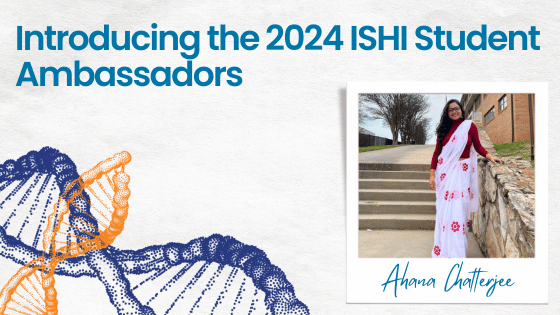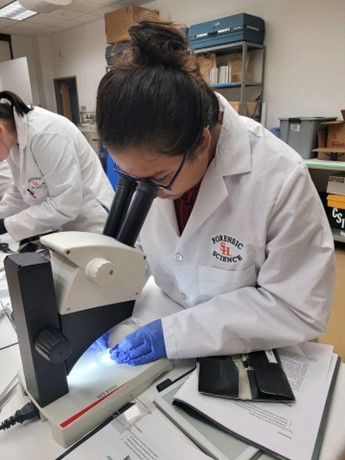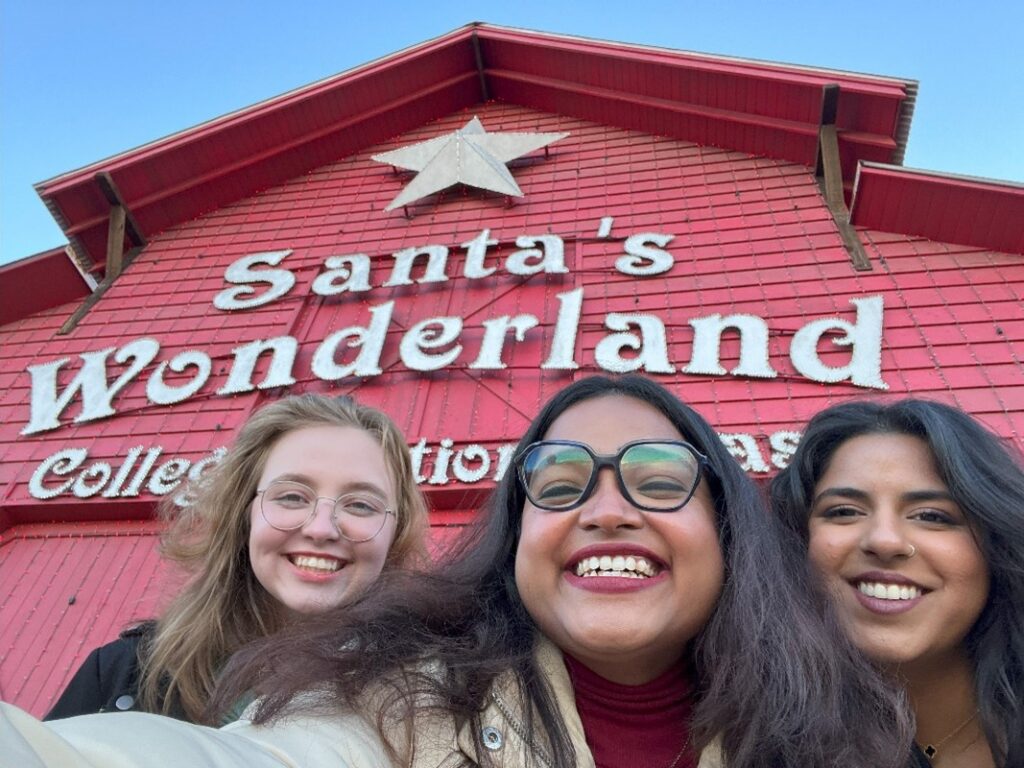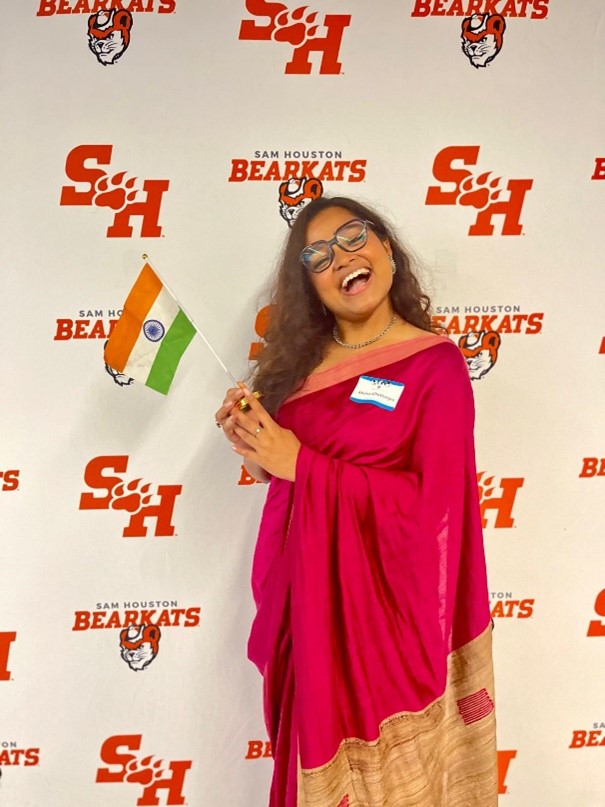In 2017, Ahana Chatterjee’s introduction to the Innocence Project during a recombinant DNA technology class in her undergraduate Biotechnology program sparked an interest in forensic science. The realization of how a simple DNA profile had the potential to rectify wrongful convictions deeply resonated with Ahana, given her background in the life sciences. This interest led her to leave her home country to pursue a master’s degree in forensic science at the University of Alabama at Birmingham (UAB) in 2021.
Upon entering the field, Ahana recognized that forensic science transcended the glamorous depictions often portrayed in mainstream media. It became evident to her that the discipline not only held immense potential but also faced significant financial constraints, whether due to the extremely expensive DNA analysis kits or the equipment in-use. Armed with this understanding, she embarked on her master’s journey with a determination to address this issue.
In 2022, Ahana began her research project in forensic biology, where they successfully developed and validated a multiplex STR amplification kit tailored for students in the field. This endeavor not only enhanced accessibility but also significantly reduced costs, making forensic education more attainable for academic institutions operating within limited budgets. By lowering the price of the kit to a mere $0.74 per reaction, they bridged a critical gap, enabling students to engage in forensic laboratory work despite financial constraints.
During the first year of her master’s program, her passion for the field only intensified, driving Ahana to pursue doctoral studies to further expand her knowledge, conduct impactful research, and learn from global experts. Hence, upon completing her master’s degree in 2023, Ahana transferred to Sam Houston State University (SHSU) for her Ph.D. in Forensic Science. As she dives deep into her doctoral studies, her commitment to solving cost related issues in the field remains constant. Ahana’s dissertation will center on developing a cost-effective genetic panel for addressing large-scale missing person cases, thereby aiming to alleviate financial barriers related to current Forensic Genetic Genealogy (FGG) approaches. After graduation, she envisions herself transitioning to the industrial sector of forensic science while acting as a global figure actively advocating for the field and debunking myths related to forensics.
We caught up with Ahana and asked her to tell us a little more about herself, including how she became interested in forensic science, what she plans to do after graduation, and what she’s most looking forward to at ISHI this year.

What are your specific areas of interest within forensic DNA analysis?
I have been conducting research in Forensic Biology since 2022, and my interest in the field has only increased over time. Currently, I am very interested in learning more about Forensic Genetics. The first time I learned about Forensic Genetic Genealogy (FGG), I was blown away by its potential. I am also aware of the technology’s shortcomings, and moving forward, I am committed to dedicating my research to bridging some of the gaps in this area.
What are some of the latest developments or technologies in forensic science that excite you the most?
Over the past two decades, forensic science has advanced at an exponential rate, with new developments occurring every other day. Witnessing this progress gives me joy. As I previously mentioned, I am particularly fascinated by FGG. The potential of this technology to solve cold cases and missing person cases excites me.
Who in the field of forensic science do you most admire and why?
I don’t think I can choose just one person as my source of motivation. Instead, I find my drive in the collective stories of those who have been wrongfully convicted due to flawed science, spending their lives imprisoned for crimes they did not commit. Additionally, I am deeply inspired by the individuals working tirelessly at disaster sites, dedicating themselves to recovering bodies and remains. These people provide me with the inspiration and determination to continue working hard and contributing to the forensic science community.

What's the most interesting thing you've learned so far in your forensic science studies?
I have learned many significant concepts, such as Next Generation Sequencing (NGS) and Kinship Analysis, as well as numerous intriguing details, like the fact that 99.7% of human DNA is identical among all individuals, or that the Christmas Tree Stain is a real technique. However, one insight that blew my mind is that you don’t need a lot of sample to obtain a good DNA profile. I found it fascinating to learn that a single diploid human cell contains 6 pg of DNA, and I have personally obtained STR profiles from as little as 1-2 pg/µL of DNA. Isn’t that incredible?!
How do you handle stress or pressure, especially when dealing with challenging studies or research?
As a PhD student and a future professional in Forensic Science, I have accepted that stress is an inevitable part of the journey. However, there are effective ways to manage stress. I make a conscious effort to engage in stress-relief practices, such as guided meditations, group therapy sessions, and spending quality time with friends. As an international student, I also prioritize video calls with my parents to vent and stay connected. Despite these efforts, there are still days when nothing seems to help, and you might find me crying over a tub of ice cream, questioning every decision. But I always manage to move on and work through it. Sometimes it gets worse before it gets better, but it always does get better.
Maintaining a work-life balance is crucial. I surround myself with people who support and cheer for me, especially when I can’t do it for myself.

What's one thing you're hoping to learn from your experience as a Student Ambassador?
I am passionate about building connections with people from all over the world. Attending this year’s ISHI as a Student Ambassador will provide me with the opportunity to meet and build relationships with forensic scientists globally. Sharing experiences with them and gaining a closer look at the expansive yet tight-knit forensic community is something I am eagerly anticipating.
What are your aspirations for the future after completing your education?
Once I complete my doctoral studies in Forensic Science, I envision myself working as a professional in the industrial side of forensics. Additionally, I aspire to become a global figure, debunking myths surrounding forensics and giving back to my country by contributing to the development of the forensic community of India.


